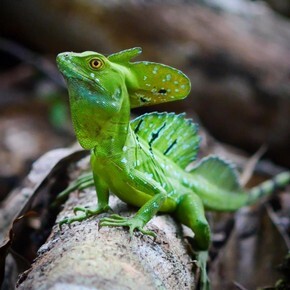- AVMA opposes Lacey Act language quietly included in the America Competes Act
Published by -NAWA News Feed- in -Legislation- · Saturday 19 Mar 2022
Concerns in the veterinary community have been raised about federal legislation aimed to stimulate the US economy by injecting hundreds of billions of dollars into domestic technology development to match China's dominance in industries like semiconductor production.
What is the explanation for this?
New limitations on the importation of non-native but common animal species, as well as a ban on their transit across state boundaries, are buried in the 3,610-page America Competes Act of 2022, which was passed by the House of Representatives last month.
The limits, which are incorporated in modifications to the Lacey Act, are meant to reduce the damage caused by exotic species. However, veterinarians and pet owners argue that the Act as written will make it more difficult to obtain veterinary care for exotic pets and may unwittingly exacerbate environmental concerns caused by non-native species.

Dr. José Arce, president of the American Veterinary Medical Association
In a written statement to the VIN News Service, Dr. José Arce, president of the American Veterinary Medical Association, said:
"The AVMA opposes the Lacey Act language that was quietly included in the America Competes Act [that was] recently passed by the United States House of Representatives, despite its good intentions. We are concerned about the proposal because it may limit access to treatment for wildlife and exotic species, as well as create bureaucratic barriers to care by requiring research institutes to obtain additional permits."
A conference committee is working to reconcile the bill with the 1,200-page U.S. Innovation and Competition Act, which was enacted by the Senate in June. Between the two compendiums of trade and industrial policy, there are hundreds of variances, including revisions to the Lacey Act that are not included in the Senate bill.
The Lacey Act: An Overview
The federal conservation law, which was enacted in 1900 and has subsequently been revised, restricts the commerce in animals, fish, and plants through state-by-state blacklists enforced by the US Departments of Agriculture and Interior.
More than 200 mammals, birds, fish, mollusks, crustaceans, and reptiles are classified as "injurious" on the blacklists, meaning they could impair human health, agriculture, horticulture, or forestry, as well as the welfare and survival of wildlife native to the United States. In the United States, blacklisted species are restricted.
Any species that isn't on the list can be imported, albeit it may require a permission or a health certificate. The list is updated on a regular basis. Because of their impact on the Florida Everglades, a modification to the Lacey Act in 2012 prohibited the importation and interstate movement of three species of python and the green anaconda.
According to U.S. Senator Marco Rubio of Florida, who is the sponsor of a separate bill to strengthen the Lacey Act that was introduced in the Senate in March, the effects of invasive species demonstrate the need for more regulations. In a press release, he said, "Unfortunately, we have learned firsthand how ecologically damaging invading species can be." "Invasive species are threatening the native plants and animals of Florida, and we must do everything we can to prevent the introduction of new, harmful species."
According to him, this entails limiting the importation of species before they're examined for invasiveness and limiting their interstate trade. Both criteria are part of the America Competes Act's Lacey Act modifications, which were added to the measure as a rider just before the House passed it on Feb. 4.
The legislator who introduced the conservation legislation amendment into the America Competes Act has remained anonymous. On any of the bill's 3,000+ pages, there is no attribution. Senator Marco Rubio was not engaged in the drafting of the House bill.

Changes proposed and their impact
The America Competes Act includes language that proposes replacing the Lacey Act's blacklist system with a yet-to-be-created whitelist of animal species that would be legal to import into the US. Rather than barring merely those who have a history of being a problem, such a system would put the burden of proof on importers to prove that their species aren't invasive or damaging in any other way.
To put it another way, all birds, reptiles, aquatics, invertebrates, arachnids, and other exotic animals kept as pets could no longer be imported into the United States or transported across state lines unless they were cleared through an administrative rulemaking process that determined they posed a low environmental risk.
Dr. Andy Anderson, a New Jersey practitioner and exotic animal owner, sees it this way: "That means they can identify any species as dangerous and ban it within 24 hours, and there's no [appeals procedure]."
Anderson is concerned that if the Lacey Act revisions pass the conference committee and become law, they will have an impact on his practice, as some of his clients own exotic pets in the nearby states of New York and Pennsylvania. Those clients would no longer be able to seek care at his office because of the new law's restrictions on cross-state transportation, he added.

"I believe a blanket veterinarian exclusion should be implemented," Anderson said. "I believe that everybody who owns avian species, reptiles [and the like] should be able to take them to the vet within reason." He went on to say that he believes lawmakers are unaware that "people take these creatures to the vet."
Anderson, who has spent his life keeping boa snakes and tarantulas, sees a range of consequences if the bill passes as worded. "I believe that if people can't get their animals to a veterinarian, they'll just discard them, exacerbating the problem," he said.
Another possibility is that people disregard the restriction, effectively preventing exotic-animal caretakers like him from transferring to another state with their animals. "Are they really going to make it impossible for people to go from one state to another? Almost certainly not, "Anderson pondered. "Even if it's illegal, people aren't going to quit keeping things. A lot of it will go underground, and we'll see more poaching and animal brown-boxing "He was talking to unlabeled direct shipments when he mentioned this.
If the Lacey Act's provisions survive conference committee deliberations, the effort will need to be approved by both the House and Senate. The process is expected to take several weeks, with the final bill (in whatever version) is expected to be passed this spring.
But proponents of the Lacey Act additions don’t feel that this new language will be on there, but all eyes are watching the movement.
To read more or let your voice be heard visit the Action Page.



